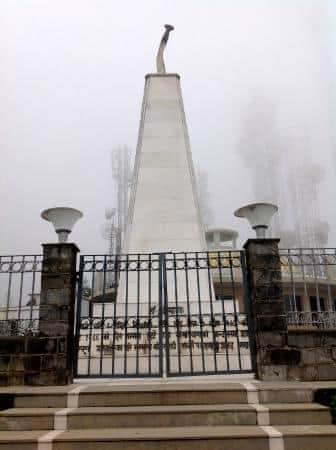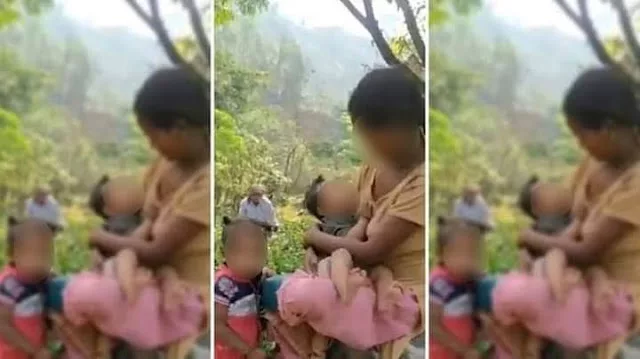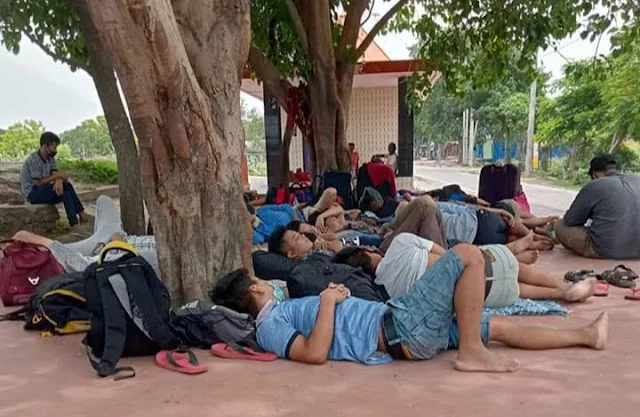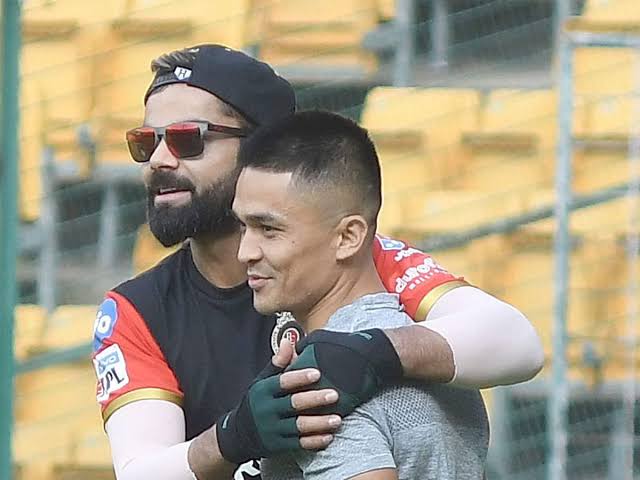 |
| Shyam Thapa with Pelé |
Shyam Thapa first found success with the institutional side of Gurkha Brigade. The Brigade used to be one of the toughest sides in Durand Cup during that era. They won the title for the first time in 1966 and repeated the success again in 1970. A young Shyam Thapa performed brilliantly in the final as Gurkha Brigade defeated Mafatlal Mills 2-1.
His professional football began in 1966, when East Bengal came to play an exhibition match in Dehradun. His performance in that match got him an offer to play in Kolkata. However, the next year, Shyam Thapa joined Gorkha Brigade and was highly successful there. Gorkha Brigade used to be one of the toughest sides in Durand Cup during that era. They won the title for the first time in 1966 and repeated the success again in 1969. He performed brilliantly in the 1969 final as we defeated BSF 1-0.
His performance attracted attention of bigger clubs and he soon rejoined East Bengal. He was the top scorer in Calcutta Football League in 1971, scoring 14 goals.
In 1972 he shifted his base to Mumbai to play for Mafatlal Mills SC. The now defunct football wing of textile giants used to be one of the bigwigs of Mumbai football at that time. Mafatlal also shared a keen rivalry with another big Mumbai club – Tata Sports Club.
Thapa rejoined East Bengal in 1975 – the strongest team in India at that point. East Bengal’s side in 1970s was arguably their most fearsome team of all times and won titles without breaking a sweat. It had brilliant players in each position with the wily PK Banerjee in its helm. They effortlessly swept away every opponent in front of them and enjoyed an unparalleled dominance in the Kolkata derby. Thapa made an instant impact in East Bengal as his brilliant strike ensured the Red and Golds defeated Mohun Bagan in Calcutta League. His two goals led East Bengal to a famous 5-0 victory in 1975 IFA Shield final.
During his first three East Bengal stints, Thapa won the Calcutta League and IFA Shield three times and the Rovers Cup title in 1975. In ’75 East Bengal did the Rovers-Shield-League treble with Thapa scoring crucial goals along the way.
Mohun Bagan Makes Thapa India’s Most Expensive Player
By 1977 the East Bengal juggernaut began to slow down. PK Banerjee joined Mohun Bagan and a string of crucial players followed suit after being suspended from the club due to disciplinary reasons. Bagan had built up a star studded side and looked to turn the tables on their arch-rivals. In his book on EB-MB rivalry, Manas Chakravarty mentions that a reason behind Thapa’s exit from East Bengal could have been the expulsion of players like Sudhir Karmakar and Gautam Sarkar. Thapa was paid a whopping Rs. 50,000 to switch allegiances, a record at that time.
His move to Mohun Bagan was one of the biggest transfer coups of 70s. Shaym Thapa reportedly expressed his desire to play for Mohun Bagan to Pradip Chowdhury, his roommate during nationals. On learning about Thapa’s willingness, Bagan coach PK Banerjee was consulted if he would suit the team. Banerjee was ready to use Thapa as a left-out, as he had used him for India. Mohun Bagan recruiters outfoxed East Bengal officials and signed Thapa on a record fee.
His start in Mohun Bagan jersey was shaky. Bagan slumped to an unexpected 2-0 loss to East Bengal in season’s first derby with Thapa being off colour. Irate supporters didn’t let the players to practice in the open field for a week. PK’s team learnt their lessons from this loss and eventually became unstoppable – winning the treble 1977 and a host of trophies in 1978. In ’78 Bagan scored a monstrous 78 goals in 22 league games (still a record) with Thapa being one of the best players. He scored a hattrick during the 7-0 thrashing of Union Club and settled the derby with a brilliant goal.
Mohun Bagan did well against foreign teams during this era and Thapa often played out of his skin in these games. Bagan’s famous match against former USSR champions Ararat Erevan in 1979 Shield final was one such example. Thapa scored a crucial goal against Pele’s New York Cosmos side when Bagan played out a 2-2 draw.
Heroics in Kolkata Derby
In his career, Thapa scored many, many wonderful goals but in the end his biggest claims to fame remain in his superb performances in the Kolkata derby. He can boast of many crucial goals for both the Green & Maroons and Red & Golds.
Shyam Thapa was one of the primary protagonists in East Bengal’s famous 5-0 victory in 1975 IFA Shield final. East Bengal were up 1-0 when they got a penalty on 11th minute. Thapa stepped up to the spot but his weak shot went out harmlessly. Missing an early penalty in such a high profile match can often dent a player’s confidence but Shyam Thapa was different. He made amends for his miss with two brilliant poacher’s goals on 24th and 51st minutes. Another one of his brilliant derby goals settled the race of 1975 Calcutta Football League. He got past three Mohun Bagan players with a superb inside dribble before curving the ball into the net with his left foot.
After joining Mohun Bagan in 1977 his ability to rise to the occasion didn’t desert Thapa. Having weathered a rough start it was his goal that earned Mohun Bagan their first Shield title in 1970s. Famous journalist and author Moti Nandi described this goal in ’77 Shield final in an incomparable manner. He compared Thapa to a “white tornado” due to the manner in which he accelerated past two East Bengal defenders and eventually flummoxed Bhaskar Ganguly with a delicate body feint. The same year he again scored a brace as Mohun Bagan beat East Bengal in Rovers Cup semi-final.
The following year he scored arguably his most famous derby goal in Calcutta League. On 41st minute Subhas Bhowmik launched a cross towards Thapa with the latter’s back turned towards the goal. Thapa met the ball with an incredible bicycle kick rooting Ganguly to his spot. Nandi wrote, “Just like glimmering white foams on a swollen wave a boot came out of a green and maroon wave and made contact with the ball. I have never seen Shyam take a more perfect bicycle kick”.
By 1980 Shyam Thapa was past his physical prime but his instincts were still in place as he continued scoring goals. He was part of the reserve bench in the ill fated derby match on 16th August 1980 when 16 fans lost their lives due to crowd unrest in Eden Gardens. In 1982 he was awarded with the Mohun Bagan captain’s arm band. Under his captaincy Mohun Bagan won the Federation Cup, Durand Cup and IFA Shield. In 1984 he made a final switch and played his last season in East Bengal.
 |
| Shyam Thapa with P.K Banerjee after 1975 Shield Final |
Shyam Thapa had a brilliant record in club level but has less international success in comparison. During his early years he won a bronze medal in Asian Games football in 1970 but that would remain as his only international trophy. Thapa’s peak years coincided with a particularly unstable period in Indian football when the Federation struggled to find a good coaching combination. As a result of managerial carousel a generation of extremely talented players who enjoyed their best form in 1970s missed out on glory for the national team.
Shyam Thapa the Coach
Thapa quickly shifted into a managerial role after leaving the game by obtaining a coaching diploma from English FA in 1987. Like his senior career, his coaching stint also started with East Bengal. In 1988 he took over India Youth team. Thapa’s experience with youth football came in handy three years later when he became part of several projects related to youth football.
When Mohun Bagan launched the Mohun Bagan-SAIL Academy in 2003, Thapa was announced as the coach. In mid-2000s he took over the Nepal youth team after their worst ever performance in SAFF Cup. Thapa’s success with the junior team led him to get the job of coaching the senior team for AFC Challenge Cup 2006. Nepal performed wonderfully in the Challenge Cup, defeating India 3-0 in quarter-final to reach the last four. A loss to Sri Lanka in tie-breaker prevented Thapa’s team from reaching the final. Other than Sayeed Nayeemuddin, who coached Bangladesh, Shaym Thapa is the only Indian coach to have coached a foreign national team. Sadly, Thapa’s reign in Nepal coincided with a volatile political situation in the country, preventing him to unearth more talents via the youth system.
After leaving Mohun Bagan-SAIL Academy Shyam Thapa joined Tata Football Academy, taking over as technical director on 1st July, 2009. He resigned from TFA in October 2009 in order to pursue his long cherished dream of promoting football in North Bengal. Till 2008 he was the director of Asian Football Federation Youth Development Programme. During his short tenure in TFA, Thapa guided the boys to one of their most famous victories; beating East Bengal 3-1 in IFA Shield.Thapa continues to work at grass-roots level and has been trying to set up a football Academy in politically unstable North Bengal for a long time.
In 2009 Shyam Thapa’s hopes of starting the Academy got a shot in the arm when he had a meeting with Gorkha Janmukti Morcha chief Bimal Gurung and also managed to acquire a ground to set up the academy. His initial plan was to start an academy with 40 footballers, divided into two age groups — U17 and U20. He had plans to branch out across the region through 10-12 non-residential centres, which would function under the direct assistance of the academy. Sadly, subsequent political problems saw his shelve those plans temporarily. In a time when some of his contemporaries have moved away from the game, Thapa toils ceaselessly for the betterment of Indian football at grassroots level. He is truly a legendary figure.
Sources: thehardtackle.com





